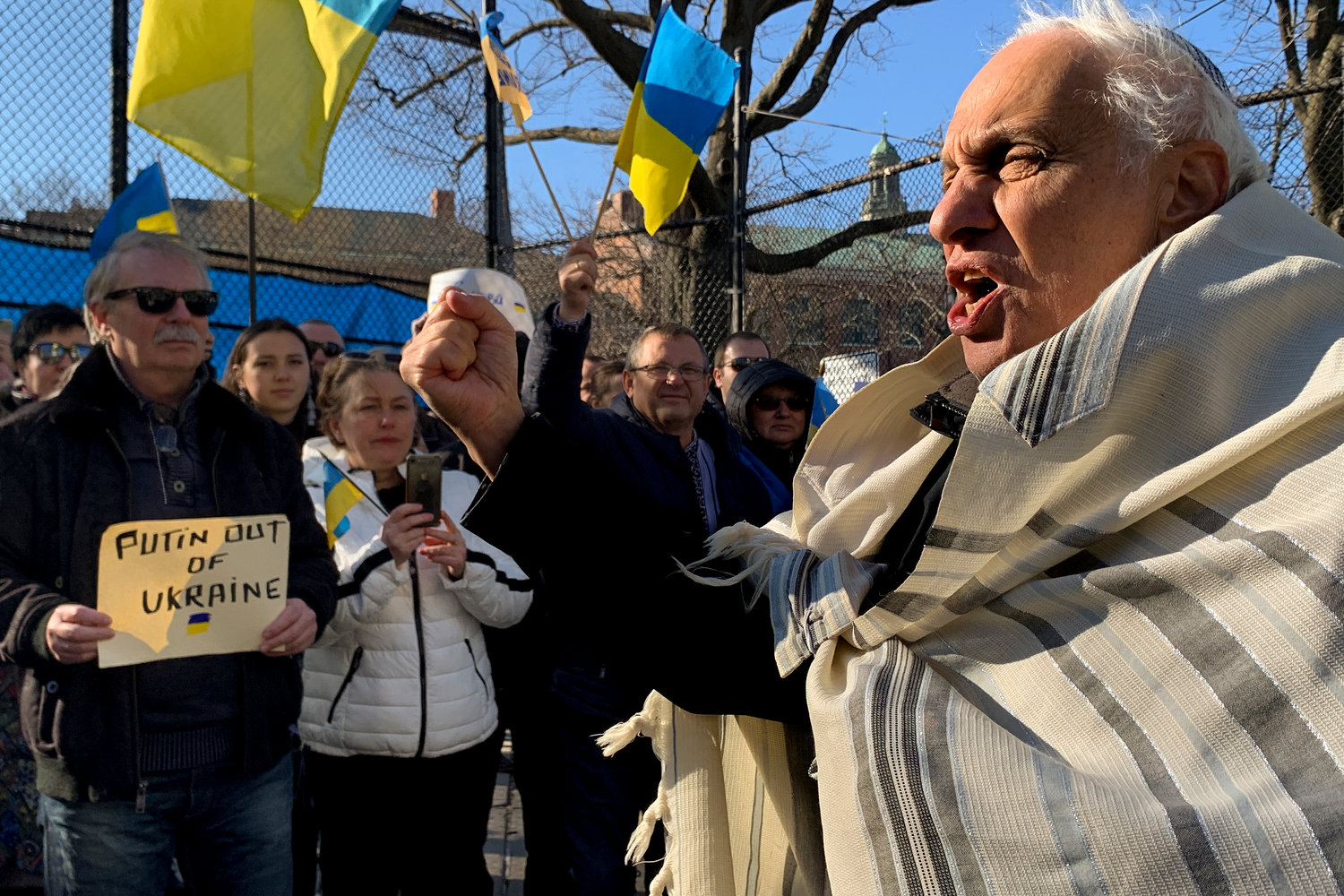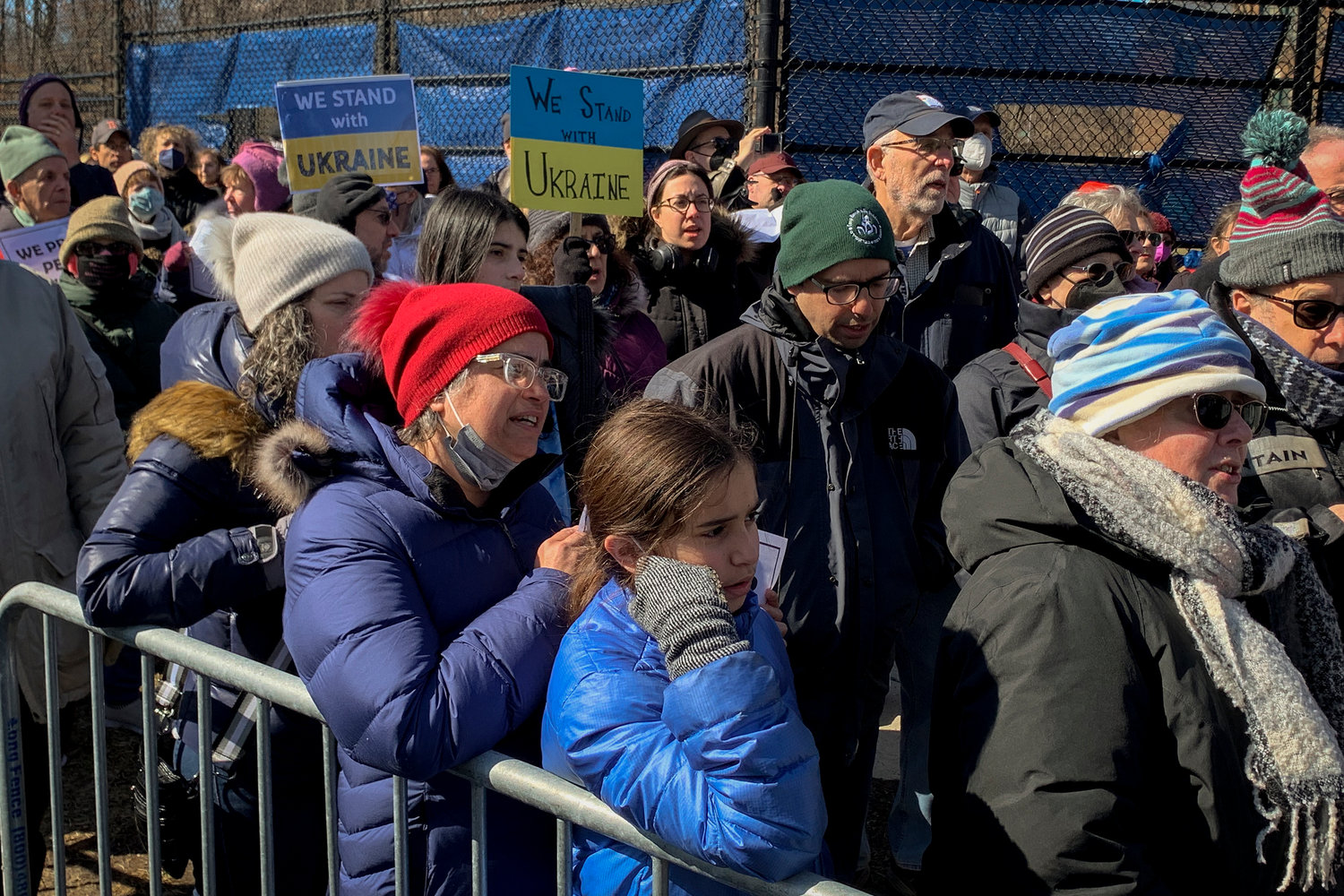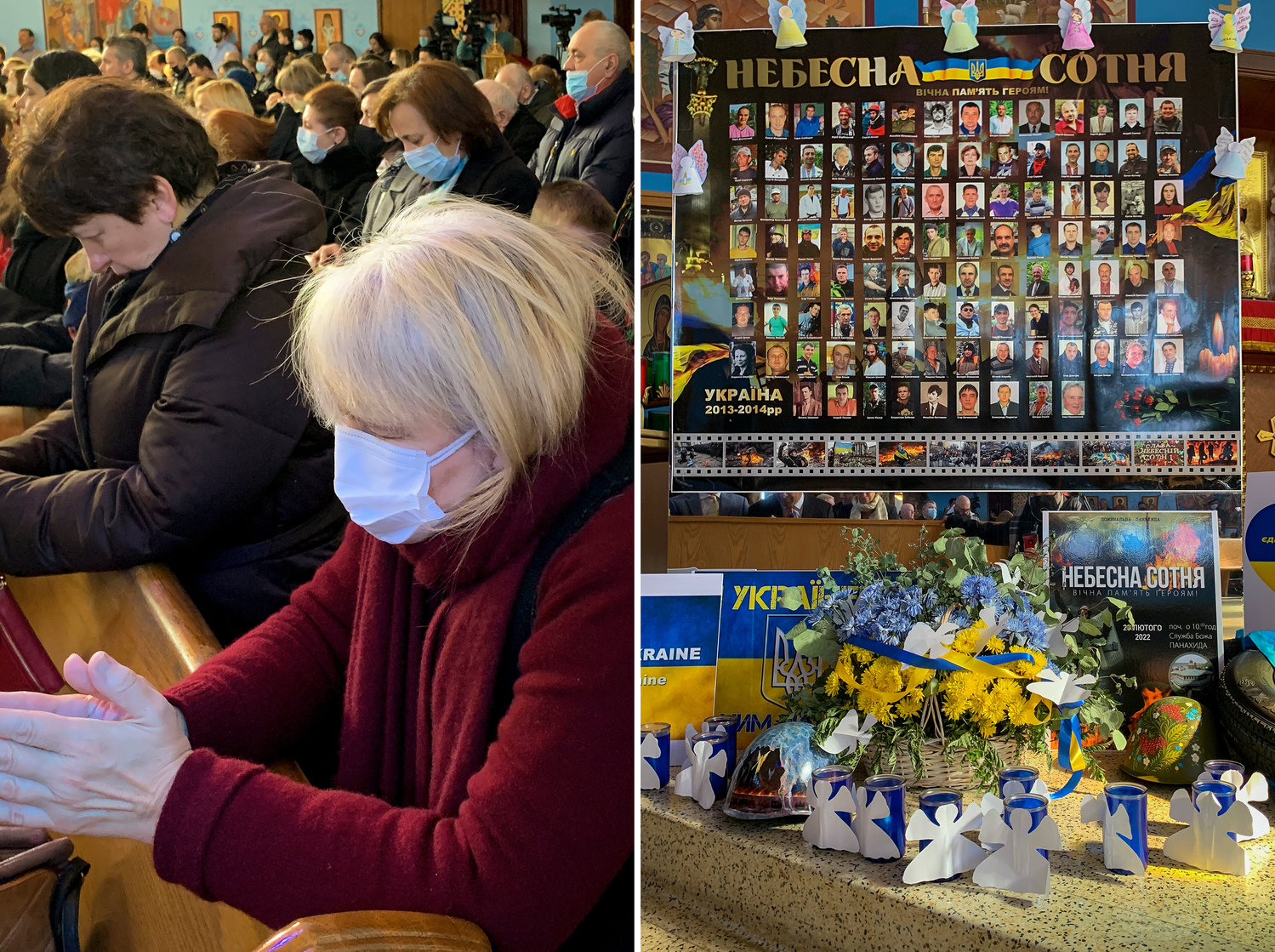Peace demanded in face of brutal invasion
It might have otherwise seemed like a typical Sunday morning Mass at St. Michael’s Ukrainian Catholic Church.
Father Kiril Angelov led the crowded sanctuary through the typical prayers, as well as calls and responses. The choir sang from a balcony in the back of the room, decorated heavily with religious iconography from throughout The Bible’s New Testament. People stood up from the pews, and then sat down again — over and over, always in unison.
Yet there was nothing typical about this particular Sunday morning in Yonkers. Television news cameras and reporters were impossible to miss. Elected officials, including state senate majority leader Andrea Stewart-Cousins and Yonkers mayor Mike Spano occupied their own seats in the sanctuary. And many were holding small blue and gold flags, representing what was once home either to them, or to those they loved.
As Angelov made his way through the liturgy, minds certainly wandered to what was happening thousands of miles and an ocean away. Days before, Russia had begun its full-scale invasion of Ukraine. Casualties were already tallying into the thousands, as troops continued to push toward the Ukrainian capital of Kyiv.
“We wanted to be here in prayer,” Stewart-Cousins told the St. Michael’s congregation, standing near a bulletin board at the altar filled with faces of those already lost.
“We wanted to be here to say that every day until this is over, we will find a way — on a federal level, on a state level, on local and county levels — to bring the pressure to bear on the Russian war. To tell them on every single level that this is not OK. We see what’s happening.”
At about the same time, just four miles to the south, a number of Bronx synagogues had gathered outside the Russian Mission residential compound on Mosholu Avenue, chanting as loud as they could, hoping anyone on the other side of the heavily fortified fencing might hear them.
Rabbi Avi Weiss, the longtime spiritual leader at Hebrew Institute of Riverdale, wrapped himself in a tallit — a prayer shawl — defended the decision of his fellow rabbis to gather in front of a compound that serves more of a residential purpose than a political one.
“Who would have thought that 30 years after the fall of communism, we would once again be standing here in this place, raising the voice of moral conscience?” Weiss told the crowd, remembering past Cold War protests from that very spot.
“During those days, we were often asked, ‘Why here? This is not a consulate building. This is not a mission. Why at a residence?’ Our response was simple. We know that the politicians and Russian diplomat hearts were hardened. But we also knew that by standing here in front of their home, their children would see and hear the protest, and go to their parents and ask with their more innocent hearts: ‘How are you? How dare you?’”
The New York Police Department had stationed personnel in front of the North Riverdale conflict since hostilities between the Russians and Ukrainians overseas intensified. Yet, at least during Sunday’s demonstrations, they were loud, but peaceful.
Later in the afternoon, a large contingent of Ukrainian nationals gathered on the same spot in front of the mission, many arriving in a parade of cars that blared their horns as they drove past the 20-story behemoth. The crowd sang patriotic songs well within earshot of the building, and at one point, even emptied bottles of Russian vodka onto the near-frozen ground.
Weiss had returned to share his support with this group, declaring he and everyone within the sound of his voice should all declare themselves as Ukrainians, and stand by the side of a community whose country was being dismantled piece by piece by its aggressive neighbor.
Ukraine seemingly never had a geographic advantage of any kind, said Oksana Kulynych, who shared some of her thoughts with The Riverdale Press ahead of a “call for peace” event Tuesday at Manhattan College.
“My parents fled Ukraine during World War II when the Russian communists were coming into the villages in the middle of the night and people kept disappearing,” Kulynych planned to tell the crowd. “They were either killed or sent to Siberia to the hard labor camps. My uncle was one of them.”
During that war, Ukraine found itself caught between two totalitarian regimes — the Soviet Union and Nazi Germany.
“That part of Eastern Europe became known as the ‘bloodlands,’” Kulynych said, “and Ukraine suffered more deaths than any other country.”
Many of those deaths occurred in Babyn Yar, a ravine in Kyiv where tens of thousands of Jews and other political prisoners were massacred. Ukraine’s chief rabbi, Moshe Reuven Azman, accused Russian president Vladimir Putin of war crimes on Tuesday after he said military forces shelled the memorial that honored the 200,000 people believed to have been killed in that spot.
“I’ve kept quiet for a long time, I will not anymore,” Azman said in a video statement, according to CNN. “I address you, dear Russians, dear Jews, everybody who’s not indifferent. Those who silently agree with what’s happening, or those who stay indifferent are complicit in this military crime — crime against humanity. I am only saying what I see. I’m not afraid to die. I could never imagine in my worst nightmare that I could due under Russian shelling.”
Some news from the front at the beginning of the week suggested solid resistance from an outgunned Ukrainian army had slowed Russia’s advance toward Kyiv. While this conflict might feel fresh for many Americans with little to no connection to that part of the world, Kulynych says the hostilities are anything but new.
“Ukrainians have been fighting the Russians for the past eight years, and over 14,000 people have died,” she said. “The world was not paying attention and opted for a policy of appeasement while Russia was building up its defense system.
“The United States, Europe and the entire free world cannot stand by idly and watch Putin destroy a sovereign nation. We must impress upon our leaders that they must act much more decisively by isolating Russia economically, politically and financially.
“Ukrainians want peace. Not war.”











